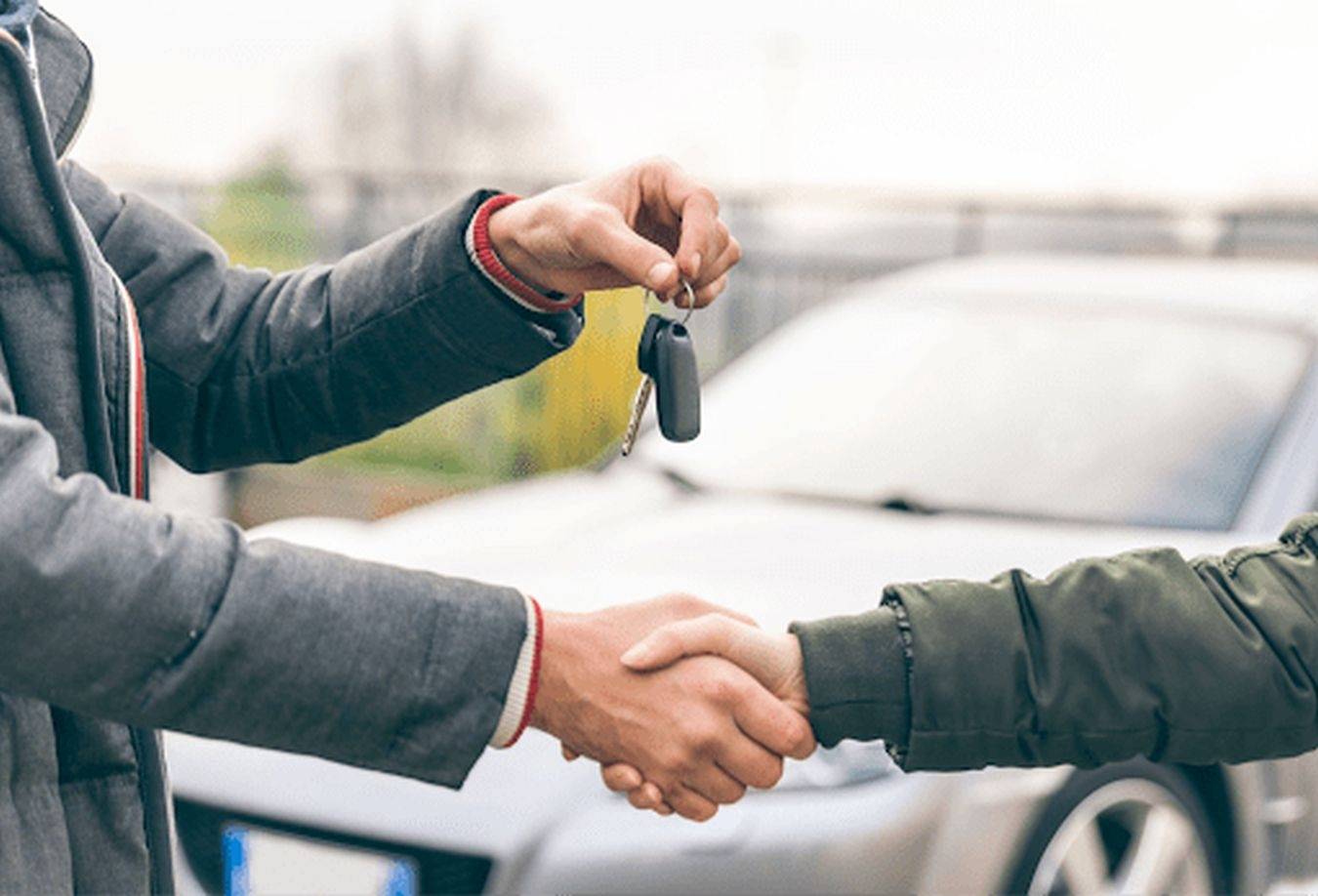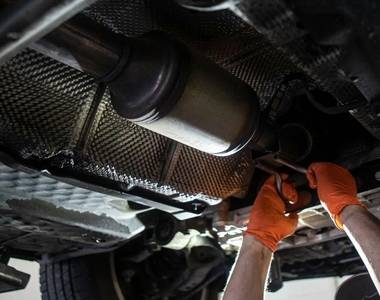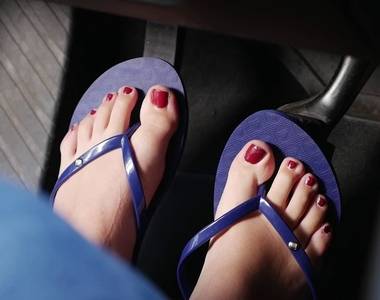Selling a car at a dealership is usually the preferred method for many people. Reputable dealers tend to give reasonable offers and completely remove the hassle of selling a car. But there are quite a few things you should know to make sure you get the best deal.

Most prefer to sell their car at a dealership because it is fast and simple. Use this guide to prepare your car for sale and get the most money possible.
How to Sell a Car at a Dealership: Step-by-Step Guide for 2023

In Q1 of 2023 alone, more than 1.8 million used vehicles were sold across the UK. Suffice it to say there are plenty of people who might want to buy your second-hand car.
If it's in great condition and you don't want to worry about finding a buyer yourself (like most car sellers), going to the dealership might be the best choice.
Of course, you might not get as much as if you sell your car privately. But working with a dealer means you won't have to deal with marketing, finding a buyer or meeting with multiple prospects for test drives and viewings.
And if you have an in-demand vehicle the dealer knows they can sell, you're in a fantastic position to get a favorable deal.
So, how exactly do you sell a car at a dealership? This article tells you everything you need to know.
Selling Your Car to a Dealership: A Quick Overview
Selling a car to a dealership is widely known as the most straightforward way to get rid of a vehicle you have on your hands.
When most people take their car to a dealership, they're looking for a cash offer. It is also possible to sell your car on a part-exchange.
Selling a Car to the Dealership for Cash
When you sell a car to the dealership for cash, the process is simple:
- Get a car valuation from the dealership
- Check if the offer is good and make sure you understand all the details
- Agree to sell your car to them
- Sign the paperwork
- Receive the cash in your bank (sometimes on the same day as the sale)
Prospective sellers often take their cars to multiple manufacturer dealerships and third-party dealers to see which one gives them the best offer. If your car is newer or in high demand, dealers may offer to match the lower price they get from a competitor.
Part-Exchanging a Car at the Dealership
A part-exchange is when you trade in your old car for a new one. In return, the dealership will give you a discount on the purchase price of the new car (equivalent to the appraised value of your old one).
Part-exchanging a car at a dealership is also quite straightforward. All you need to do is:
- Bring your vehicle in for an inspection and valuation
- Agree to the offer if you are happy with it
- Pay the difference between the cost of the new car and what you get for your older model (or take out finance)
- Sign all paperwork
- Receive your new car and the keys
The part-exchange process is quite attractive for sellers because you don't have to worry about finding a buyer or negotiating with them. It's also convenient if you need a new car right away and are happy with your current brand.
A tip from the pros: A part-exchange is a complicated process because you're merging two transactions. If you decide to go this route, we strongly recommend getting a price before mentioning your interest in a part-exchange and keeping the two deals separate to ensure you negotiate the best price for both your vehicle and the new one.
Selling a Car on Finance
In the UK, it is illegal to sell a car if it carries outstanding debt. If you carry through with the transaction without the dealer's knowledge, they or the finance company may pursue legal action.
To legally sell a financed car, you first need to end your Hire Purchase Agreement and settle your debts with the lending organisation.
When you sell to a dealership with outstanding finance, however, you have a few more options. The dealer might offer to settle your contract directly with the lender and pay you the surplus in cash — in which case, you could put it toward a down payment on another car or put your cash in the bank.
Selling a Used Car to the Dealership
Technically, every car you sell to the dealership will be considered "used". That's why its value drops as soon as you drive it off the forecourt.
By the time you've owned it for a year, you're looking at 15% to 35% of its value gone (depending on the model).
A huge factor the dealer will consider in valuing your car is its ownership history — if you purchased a second-hand car (that is, there were other owners before you), you might not receive an offer as high as if you'd bought it from the dealer's forecourt in the first place.
Taking your car to a dealership that specialises in selling those makes and models gives you an edge. The staff will be more familiar with its value and may give you a higher offer for it.
Will a dealership buy your car?

Dealers are indeed in the business of selling cars. But more broadly, they are in the business of making money. They don't want to buy pieces of junk that will sit on the lot forever.
If you were planning on selling a non-running car, a salvage car, or a damaged car, they almost certainly wouldn't accept it.
Dealers are also unwilling to take on liabilities. They will require you to have all your documents in order, meaning you cannot sell a car without a V5C logbook.
Demand plays a big role in the sale process as well — if they don't think they can sell your car quickly at a decent margin, you're out of luck. In that sense, it is a bit like talking to multiple buyers on your own.
If your car is fairly new and in good condition (i.e., it's not damaged, has no mechanical issues, and is up-to-date on maintenance), chances are good they will make you an offer.
Pros of Selling to a Dealership
- Fast, convenient sale. Most people sell to dealerships simply because they don't want to deal with the hassle of marketing, finding a buyer, negotiating prices or meeting prospects for test drives and viewings.
- Receive cash up-front. When you sell your car to a dealership, you typically receive the money on the same day (or near the same day) as your sale.
- Scam protection with a trusted buyer. Since dealers are businesses that represent the brand you're selling and carry out multiple sale transactions per day, you can trust that they will be a safe and reliable buyer.
- Part-exchange capability. If you're happy with your current brand or need a car quickly, selling to a dealer on part-exchange saves you an additional trip to the dealer.
- Less knowledge required. You don't need any special skills to get a good deal — just make sure you get quotes from multiple dealerships before settling on one. To sell a car privately, it's better to be well-versed in car market dynamics.
- Higher bargaining power for in-demand vehicles. If you have a car your dealership could easily sell to a customer, they would rather take your vehicle than let you walk. This gives you additional wiggle room in the negotiation process.
Cons of Selling to a Dealership
- Less money for your car. Of course, the caveat to the convenience of selling to a dealership is that you won't receive as much money for your car. The dealer needs to make money from reselling it (and paying employees to resell it), so they'll always give you a lower price than what it's worth in the private market.
- Limited negotiation power in most cases. The dealer will have to consider its own profit margins, sales targets, and current buyer interest when valuing your car. This limits your negotiating power.
- In-person transaction. Some prefer to sell a car online because they can get an instant cash offer based on the car's specifications. Selling at a dealership requires the seller to visit multiple dealers, which could be a tremendous inconvenience.
- Part-exchange value is sometimes lower than your actual car's worth. Dealerships might offer much lower part-exchange values on cars because of the convenience factor for customers wanting to switch brands or models quickly. That's why it's important to negotiate a sale price before showing interest in a part-exchange.
- Limited sale options. As we mentioned above, dealers are picky with their inventory. If you have a car that isn't in high demand, they won't be as eager to buy it from you.
- Lack of personal touch. Selling to a dealership is often impersonal — no one cares about your car as much as you do, so there won't be any emotional connection or appreciation for its quirks or special features.
Tips for Selling Your Car to a Dealership
Although you'll have to know going into it that you won't get as good of a sale price, there are several things you can do to maximise the amount you get out of your sale.
Research prices ahead of your sale.
Car dealers are always more flexible when they know the seller in front of them has done their research.
Unlike working with private buyers, you won't be fending for yourself when you sell to a dealer. Still, it's important to remember they are in the business of making money — not necessarily helping you get as much as possible.
Briefly, there are a few basic factors that impact the price of your vehicle:
- Make, model, and year
- Service and maintenance history
- Parts replacement (genuine or aftermarket)
- Mileage
- Vehicle performance
- Seasonality and current demand
- Scuffs, scratches and dents
- Interior condition
- Cleanliness
To better understand your car's market value, check out our guide to figuring out how much your car is worth. Then, use our car valuation calculator to get a reasonable estimate.
Do a thorough cleaning before showing your car to the dealer.

Seeing is believing (trust us). If there is one thing you 100% should do, it's prepare your car for sale.
Doing so will save the dealership considerable time and effort in making it presentable for its buyers. Plus, they'll see your car in a more positive light. The more dirt, grime and old rubbish you have in the car, the less likely they are to make a decent offer on it — even if it performs well otherwise.
Clean out your car completely (including the boot) and give it a proper wash and wax before meeting with the dealer. Or, take it to a professional detailing service to have the work done for you.
If your carpet, floor mats, or other interior fabric are stained or damaged beyond repair, replacing them might be a good idea as well.
Gather necessary documents ahead of time.
Having the right documentation ahead of time shows the dealer you're organised, trustworthy and upfront about your vehicle's condition. It also makes the process a whole lot less tedious.
Your dealer will ask you for your V5C, MOT certificate, and other documentation before carrying through with the sale anyway, so it's best to lead in with the paperwork. Have physical copies printed out and sorted when you show up to the dealership.
Compare dealers and find the one that suits you.
Whether you're selling a van, a car, or a motorbike, you should always compare dealers before settling on one.
Visit multiple dealerships in-person to talk with their reps and get a few offers for your car. While you're there, find out if they're open to matching offers you receive from other dealers.
Have reasonable expectations.
At the end of the day, you can't expect to get all your money back from a car dealership. The value drops at least 10% the second you drive off the forecourt and only goes down from there.
Remember: The only reason a dealer is buying your car is because they know they can make money reselling it.
Process of Selling a Car to a Dealership
When you take your car to a dealership, the sale process is quite simple. Chances are good they handle several sales per day and are well-trained on all the procedures.
Although the amount of time it takes will vary based on your personal circumstances, here's a general overview of what to expect:
- Make an appointment with the dealership
- Provide proof of ownership and all necessary documents
- Have your car inspected by the dealer
- Negotiate the sale price or part-exchange value
- Sign the paperwork and receive payment
- The dealer will notify the DVLA on your behalf
Once the process is complete, the dealership is now the legal owner of your car. They will either resell it in full or use it as part of a part-exchange deal.
Documents Required to Sell Your Car to a Dealership
There are several documents you need to sell your car. The most important ones for selling to a dealer are:
- your V5C logbook
- a valid MOT certificate
- proof of ownership (e.g., a bill of sale)
- service records and maintenance history
- insurance claim and accident history
- parts receipts (to assure all parts are genuine)
If you have private number plates, you will also need to fill out a V317 form. This document will be sent to the DVLA and outlines your transfer of the number plates from your old car to a new one.
Gather all the documents listed above before you start talking to dealers. They won't bother to make an offer unless you have all the proof they need to make a confident purchase.
To Sum Up
If you plan to sell your car to a dealership, you'll save heaps of trouble. But, you should also remember that it's a business transaction — not an emotional one.
You'll get a fair price for your car, but it won't be the highest possible offer. To maximise your sale potential, it helps to know a bit about the market beforehand, clean your car thoroughly and bring all the necessary paperwork on your first visit. After you've received offers from multiple dealers, you're ready to choose the one that suits you best!
Want to learn more? These are the questions our sellers ask us most.
Should I buy my car at a dealership?
Buying your car at a dealership is a sure way to protect yourself from car selling scams. Dealers are usually more expensive than private sellers, but the peace of mind and warranties they offer make up for it. If you plan to finance your car, a dealership will be your only viable option.
What’s the best way to pay for a car from a dealer?
When you purchase a car from a dealer, you can either purchase it outright or finance it. If you flat-out buy it, you will either write them a cheque, pay with a bank card or issue a bank transfer. Financing a vehicle involves making a down payment and entering a Hire Purchase Agreement with a lending institution (who will be the legal owner of your car until the loan is settled).
Can you negotiate with car dealerships?
Both sellers and buyers can negotiate with car dealerships, but not to the point of severely reduced profit margins. Generally, dealers have fixed margins that they cannot go below for certain cars or manufacturers. If you can find a similar car elsewhere, though, they are usually open to offering competitive prices to win your business.
What to do if a dealership sells you a faulty car?
According to the Consumer Rights Act 2015, new and used car buyers have the right to request a full refund within the first 30 days of ownership if a car proves to be faulty. The same rule applies to service and repair work that renders the car unfit for use.
What is a car dealership?
A car dealership is a business that sells and services new and used cars. Dealerships are typically franchised to sell and service vehicles from specific manufacturers, such as Renault, Nissan or Toyota. They may also offer financing plans and extended warranties on their sold vehicles.
Do car dealers need to tax cars?
It is your responsibility to notify the DVLA when you purchase a new or used car. If you buy through a dealer, they may offer to tax the vehicle on your behalf and incorporate the cost into the final sale price.










